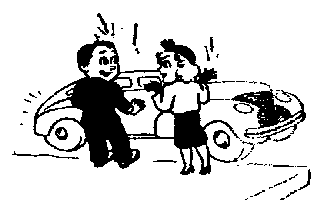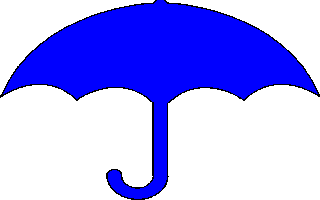INFORMATION ABOUT
AUTOMOBILE INSURANCE
![]()
Automobile insurance, although costly, is a necessary expense to protect you and your loved ones if an accident occurs. Most states require this to register your car, you should understand the different kinds of coverage available. Insufficient coverage can be an expensive mistake if you have an accident, since payment by the insurance company is based upon the coverage in effect when the accident occurred.
We hope that the information presented here will help familiarize you with basic automobile insurance issues and terms. While the material below attempts to answer common questions in this area, State and local laws may significantly modify the facts set forth. Because all legal problems are unique, nothing provided here is a substitute for the advice of competent counsel. We strongly urge you to consult with an attorney licensed to practice in your state about any particular legal problem you may have.

WHAT IS LIABILITY COVERAGE?
![]() As a general
rule of law in the United States, one who is responsible for causing an accident
has to pay the injured person's reasonable damages. The liability coverage portion
of your automobile insurance policy protects you from having to
personally pay any judgment rendered against you if you are found to be responsible for
an automobile accident. The maximum amount your
insurance company will pay is determined by how much coverage you originally
bought. For example, if you bought $50,000.00 of liability coverage, your
carrier would pay up to the $50,000.00 limit to satisfy an out of court
settlement or a court ordered judgment. Any judgment above your coverage limit
remains your personal responsibility. Usually payment of a claim by an insurance
company will result in a surcharge to the policy increasing your premium in
future years. However, an insurer cannot increase your premium rates solely
because you or one of the insureds under your policy received payment for a
claim, unless it is determined that you or the insured was at fault.
As a general
rule of law in the United States, one who is responsible for causing an accident
has to pay the injured person's reasonable damages. The liability coverage portion
of your automobile insurance policy protects you from having to
personally pay any judgment rendered against you if you are found to be responsible for
an automobile accident. The maximum amount your
insurance company will pay is determined by how much coverage you originally
bought. For example, if you bought $50,000.00 of liability coverage, your
carrier would pay up to the $50,000.00 limit to satisfy an out of court
settlement or a court ordered judgment. Any judgment above your coverage limit
remains your personal responsibility. Usually payment of a claim by an insurance
company will result in a surcharge to the policy increasing your premium in
future years. However, an insurer cannot increase your premium rates solely
because you or one of the insureds under your policy received payment for a
claim, unless it is determined that you or the insured was at fault.
WHAT IF I AM INVOLVED IN AN ACCIDENT?
![]() If you
are involved in an accident, report the facts to your insurance
carrier at once. The carrier will attempt to resolve the claim within the
coverage limits of your policy. If a lawsuit is filed against you, your
insurance company
If you
are involved in an accident, report the facts to your insurance
carrier at once. The carrier will attempt to resolve the claim within the
coverage limits of your policy. If a lawsuit is filed against you, your
insurance company  will provide an attorney
to represent you in accordance with the terms of policy.
will provide an attorney
to represent you in accordance with the terms of policy.
WHAT IS YOUR "LIMITED TORT" OR "VERBAL THRESHOLD?"
In an effort to reduce insurance costs, many states have adopted policies at lower premiums. However, these policies but that restrict your right to sue if you are injured in an accident or give you the option of giving up your right to sue in certain circumstances. These policies may be referred to as "verbal thresholds" or "limited tort options." This type of policy generally PROHIBITS you from making a claim for pain and suffering and other non-economic damages unless the accident has resulted in death, dismemberment, permanent disfigurement or serious injury as defined by the courts of your state. For example, if you suffered soft tissue damage in an accident and had chosen a limited tort option, you might only be able to recover your out of pocket expenses but NOTHING for being in excruciating pain for several months. If you choose one of these plans, your choice will generally govern the rights of all members of your household covered under your policy.
Although you may save a little money by choosing a limited tort option, it will also restrict your right to recover full compensation in claims for less serious injuries that nevertheless could cause disability, absence from employment and substantially interfere with your enjoyment of life. So be very sure that you understand what it is you are agreeing to give up before you agree to accept a limited tort option on your insurance policy.
WHAT ARE FIRST PARTY BENEFITS?
![]() In
insurance parlance, you, the purchaser of automobile insurance are known as the
"first party." The "second party" is the insurance company
and the "third party" is the other party involved in an accident. The
liability coverage discussed above protects you from claims of a third party.
Your automobile insurance policy also provides various coverages that protect
you. These are known as "first party benefits." Examples of first
party benefits are set forth below:
In
insurance parlance, you, the purchaser of automobile insurance are known as the
"first party." The "second party" is the insurance company
and the "third party" is the other party involved in an accident. The
liability coverage discussed above protects you from claims of a third party.
Your automobile insurance policy also provides various coverages that protect
you. These are known as "first party benefits." Examples of first
party benefits are set forth below:
1. UNINSURED AND UNDERINSURED MOTORIST COVERAGE (UM & UIM)
Uninsured motorist (abbreviated "UM") and underinsured motorist (usually abbreviated "UIM") are standard state-mandated additions to a basic minimum policy in some states. In other states, you do not have to carry either type of coverage.
Uninsured motorist coverage protects you if you are injured by an uninsured driver or in a hit-and-run accident. "UM" coverage does not ordinarily cover property damage claims. The maximum amount you can collect from your insurance company on a "UM" claim is determined by the amount of coverage you bought at the time you purchased the policy.
Underinsured motorist coverage protects you if the liability coverage carried by the third party (the person who caused the accident) is not sufficient to fully compensate you for your injuries. Should your injuries be extremely serious and the policy limits of the third party inadequate, you may then turn to your own "UIM" carrier for additional compensation. A claim for "UIM" benefits is more complicated than a claim for "UM" benefits because many "UIM" insurance contracts contain certain approval clauses which, if not complied with, can result in the loss of benefits. "UIM" coverage, like "UM" insurance, does not ordinarily cover property damage and is limited by the amount of coverage purchased.
2. COLLISION AND COMPREHENSIVE COVERAGE
Collision and comprehensive coverage, although purchased together, are separate coverages under your insurance policy. Each coverage carries its own deductible. Collision and comprehensive coverages are not normally required by state law, but may be required by a bank or leasing company if you are financing your car.
 Collision coverage provides
protection for damage done to your car. If your vehicle is damaged, either in
an accident with another person or through your own carelessness.
Collision coverage provides
protection for damage done to your car. If your vehicle is damaged, either in
an accident with another person or through your own carelessness.
Your carrier will pay the reasonable cost of the necessary repairs , less the deducitible. If the repairs are more than the fair market value of the car, the carrier will pay the fair market value, less the deductible. The deductible is the first $100 or $500 or $1,000 dollars of the repair bill and is your responsibility. You choose the size of the deductible when you purchase the coverage. The higher the deductible, the lower the premium. The carrier will want to either see estimates you obtained for the repairs or may have the car inspected by a mechanic of its choice. If the carrier is going to have the car inspected, it is a good idea to already know the approximate cost of repairs from a body shop of your choice.
If the accident was not your fault and the other driver was insured, your insurance company will try to eventually obtain reimbursement for its payment and your deductible through a process called "Inter-Company Arbitration." When this is concluded, a check for your deductible will be sent to you. However, if the accident was your fault, depending upon how much the carrier paid and the state in which you reside, the insurance company may surcharge your policy and increase your premium.
Consider the following points when deciding whether to buy collision coverage:
1) The current value of your
vehicle;
2) The cost of a new vehicle;
3) The amount of the insurance premium.
When purchasing collision coverage, inquire whether your insurance carrier offers Rental Reimbursement coverage. Although this coverage is generally very inexpensive, it pays a lot of your bill while your vehicle is being repaired.
Comprehensive coverage provides protection to your vehicle for mishaps other than collision. These may include fire, lightning, theft, vandalism, fallen trees, storms, floods, and sometimes even earthquakes and riots. It may also cover the individual parts of the vehicle such as windshields, tires, hubcaps, antennas, and permanently installed sound systems. All claims, however, are subject to a deductible which may be in a different amount than for your collision coverage.
HOW DOES AN INSURANCE COMPANY ARRIVE AT THE VALUE OF A "TOTALED" CAR?
![]() Each
state sets its own rules on determining the value of a totaled car. Each
insurance company must use legislative guidelines of its individual state in
order to determine the value of the totaled car. Frequently, the guidelines
refer to book values of the vehicles. If that is the case in your state,
your attorney can refer you to the "book" that sets the value.
Each
state sets its own rules on determining the value of a totaled car. Each
insurance company must use legislative guidelines of its individual state in
order to determine the value of the totaled car. Frequently, the guidelines
refer to book values of the vehicles. If that is the case in your state,
your attorney can refer you to the "book" that sets the value.
3. MEDICAL AND WAGE LOSS COVERAGE.
![]() Many
states require basic automobile insurance coverage to pay for medical, dental
or rehabilitation expenses, wage loss, funeral expenses and/or accidental death
benefits arising out or a car accident for you and any passengers in your car.
The amount of coverage provided is determined at the time you purchase the
insurance, but many states require a specified minimum amount.
Many
states require basic automobile insurance coverage to pay for medical, dental
or rehabilitation expenses, wage loss, funeral expenses and/or accidental death
benefits arising out or a car accident for you and any passengers in your car.
The amount of coverage provided is determined at the time you purchase the
insurance, but many states require a specified minimum amount.
WHAT IS STACKING?
![]() When
an automobile insurance policy provides liability, uninsured and/or
underinsured motorist coverage for more than one motor vehicle, some carriers
in certain states for an additional premium, allow the insured to
"stack" the policy limits of coverage. This means that the limits of
coverage available to you will equal the sum of the limits for each individual vehicle
covered by the policy.
When
an automobile insurance policy provides liability, uninsured and/or
underinsured motorist coverage for more than one motor vehicle, some carriers
in certain states for an additional premium, allow the insured to
"stack" the policy limits of coverage. This means that the limits of
coverage available to you will equal the sum of the limits for each individual vehicle
covered by the policy.
WHAT ARE EXTRAORDINARY BENEFITS?
![]() Carriers
in several states offer an additional coverage, sometimes called
"extraordinary" benefits, which can be purchased for a relatively
nominal annual premium. This coverage
Carriers
in several states offer an additional coverage, sometimes called
"extraordinary" benefits, which can be purchased for a relatively
nominal annual premium. This coverage  provides payment for
extraordinary medical expenses that result from catastrophic injuries.
Extraordinary benefits subsidize the expenses that most standard health
insurance policies do not cover. For example, if as a result of an accident you
are confined to a wheelchair, extraordinary benefits coverage could be used to
pay for renovations to your home to accommodate the wheelchair. If you are
interested in such coverage, discuss this with your insurance agent to see
whether it is available in your state, exactly what coverage is provided and find out the cost.
provides payment for
extraordinary medical expenses that result from catastrophic injuries.
Extraordinary benefits subsidize the expenses that most standard health
insurance policies do not cover. For example, if as a result of an accident you
are confined to a wheelchair, extraordinary benefits coverage could be used to
pay for renovations to your home to accommodate the wheelchair. If you are
interested in such coverage, discuss this with your insurance agent to see
whether it is available in your state, exactly what coverage is provided and find out the cost.
WHAT HAPPENS IF MY INSURANCE LAPSES?
![]() If
your insurance lapses and your car is not financed, your license may be
suspended. But if you have financed your car and let your insurance lapse, the
finance company may be permitted to obtain insurance on your behalf at your
expense.
If
your insurance lapses and your car is not financed, your license may be
suspended. But if you have financed your car and let your insurance lapse, the
finance company may be permitted to obtain insurance on your behalf at your
expense.
DESSEN, MOSES & ROSSITTO is happy to assist you in any legal matter that involves either Pennsylvania or New Jersey, the two states in which our attorneys routinely practice. If you wish to contact us for more information concerning this field of law or any other in which we practice, please send us an E-mail message and we will be happy to try to assist you.
![]()
LINKS TO OTHER INTERESTING INFO
Auto Trader
Better Business Bureau OnLine
Carfax Vehicle History Service
Car Trackers
Complete Glossary of Insurance Coverage Explanations
Federal Trade Commission (FTC)
Insurance Information Institute
Insurance Resources Online
Insurance
Terms - Auto, Life, Health and Property
![]()
Top of Page | DM&R Home Page
| Legal Article Wall
About DM&R | To Retain
DM&R | Ask Us A Question
![]()
Copyright © 1996 -
2006 Dessen, Moses & Rossitto
All rights reserved.



